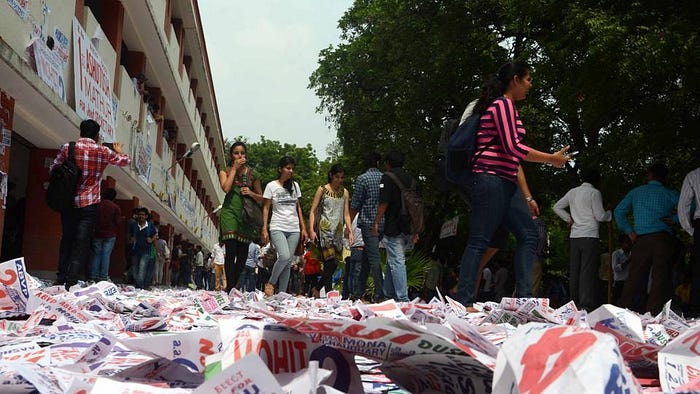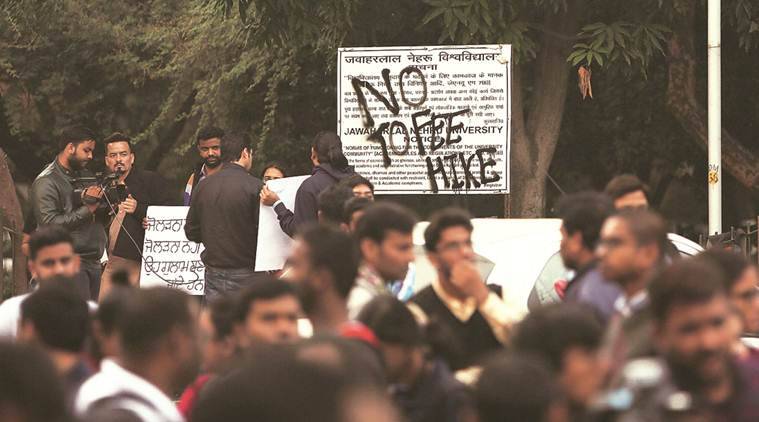While in many countries, student political activism is a comparatively recent phenomenon beginning with the 1960s, India has had a chequered and magnificent history of student activism in the independence struggle. In this age, colleges and universities have taken responsibility for civic engagement through curricular and co-curricular experiences which allows college students to have opportunities to impact both local and national issues.
College Students: A politically silent generation?
In the past decades, various studies have focused on college student demography to assess the civic and political health/awareness of the new generation. The results portray a generation that possesses much more civic potential, yet, surprisingly, it is disconnected from the field of conventional politics. There is widespread evidence, along with a general depiction in media, that college students, all around the world, today are cynical and indifferent about politics. While in many countries, student political activism is a comparatively recent phenomenon beginning with the 1960s, India has had a chequered and magnificent history of student activism in the independence struggle. The nationalist movement provided a facade of political identity to the Indian youth, in general, and student youth in particular.
Student political activism in the 1980s and 1990s (an ideology tending towards soft left and right of center) began to take a different character from the 1960s and 1970s (with a far-leftist ideology), the new era has surely emerged with its own identity of civic engagement and social activism.
In this age, colleges and universities have taken responsibility for civic engagement through curricular and co-curricular experiences which allows college students to have opportunities to impact both local and national issues.

Case Study: Delhi University
The past few years have noticed a steady rise in the role of student bodies in the circuit of Delhi University. Ever since 2000, the Delhi University Students Union (DUSU) has peaked its importance in the university. The student political parties are backed by some significant national parties like Akhil Bharatiya Vidyarthi Parishad (ABVP) is the student wing of the Bharatiya Janata Party (BJP), National Students’ Union of India (NSUI) is the student wing of the Indian National Congress, there are several other student political organizations like All India Students’ Association or All Indian Students’ Federation and many more. A recent addition to the list is the Aam Aadmi Party-backed Chatra Yuva Sangharsh Samiti (CYSS). Since Delhi University is one of India’s largest and prominent universities, it serves as a great platform for younger generations to express their opinions on diverse social and political issues.
While the major plus point for being actively involved in a student’s union is gaining popularity, honing leadership skills and walking into a knowledgeable future in the political arena. The student bodies have responsibilities in accordance with the university’s constitution. In addition, a lot of the nuisance created at the student level is not prevalent at the bigger stages. Apart from the constitutional responsibilities, there is a big difference between international student bodies and the ones in India, and the question of difference has risen as a result of various studies.
When we compare the organization to the western counterparts, our student unions are still emerging but, are we freeing ourselves from the shackles of unclear domains when it comes to politics? Do our student unions reflect the un-impressive struggle Indian politics has faced in comparison to the world? These questions still remain unanswered.
The success and status of student politics can only be judged by students who are directly affected by it.

What Delhi University Students Say
The interviews with college students have received mixed opinions on student unions. Some students say that student politics is inevitable in institutions. The goal of any university is not to, myopically, train students in a subject but to prepare students holistically for unforeseen and unimagined things that life has to offer. Hence, politics becomes very important as a part of the college curriculum. Students opine that participating in political activities from such a young age gives them a boost in this field, especially since numerous Indian politicians have risen from the cradle of student politics, the prominent ones being Former Finance Minister Late Arun Jaitley, Current Rajasthan’s CM Ashok Gehlot, Former Railway Minister Lalu Prasad, and Current CM of Bihar Nitish Kumar.
A contrary view suggests that increased popularity of student politics has affected the academic record of students. Every student who is willing to take classes due to peer pressure participants in protests, strikes, etc. These people who hold contrary views condemn political violence entering the ‘educational temples’ of modern India. According to another perspective, politics stand as an attractive career option though there are certain criticisms attached to it, one of them being dynasty politics.
An article in Sydney Morning Herald, points aforementioned viewpoint, stating, “In India, politics is not a vocation, but a family business.” In addition, Amrit Dhillon, a freelance journalist, also commented, “Whichever party you look at, in every part of India, nepotism is rampant. Merit, a record in public life, knowledge, skills, character, are all irrelevant. If you have the right surname, you will get a ticket.” — thus, students with the so-called not ‘right surname’ tend to avoid pursuing politics as a career from a young age.

While opinions vary from regions to universities, one thing remains constant like, students unanimously feel that the answer is not in discarding all forms of politics but in changing the kind of politics practiced. Currently, the type of politics practiced, both in the national parliament and college campuses, is disruptive and destructive. This adversely affects the legislative process and academics respectively.
The need of the hour is that the leaders of tomorrow must rise to the occasion and invent new and groundbreaking ways of dissenting without disrupting the academic discipline of the institution. To bring about this change in the nature of politics in our institutions, the most important thing is to guarantee the complete autonomy of these institutions. Freedom from any ideology will ensure standing up for the right cause in an appropriate manner.
Conclusion
The myth of impartial politics is still miles and miles away. It is important to note that there are pros and cons, both, attached to the increasing importance of the student bodies in institutions. As the college or student politics is still growing in other universities, the Delhi University case study places a good reflection. Delhi University sets a good example to assess when comes to student political bodies and their role in the overall national hierarchy of democracy.
The objective of a ‘Think Article’ is to bring knowledge about policies in the sphere, in context to the youth of India and, if possible, influencing the policy process. The article has no motivation to pass any political judgments.




